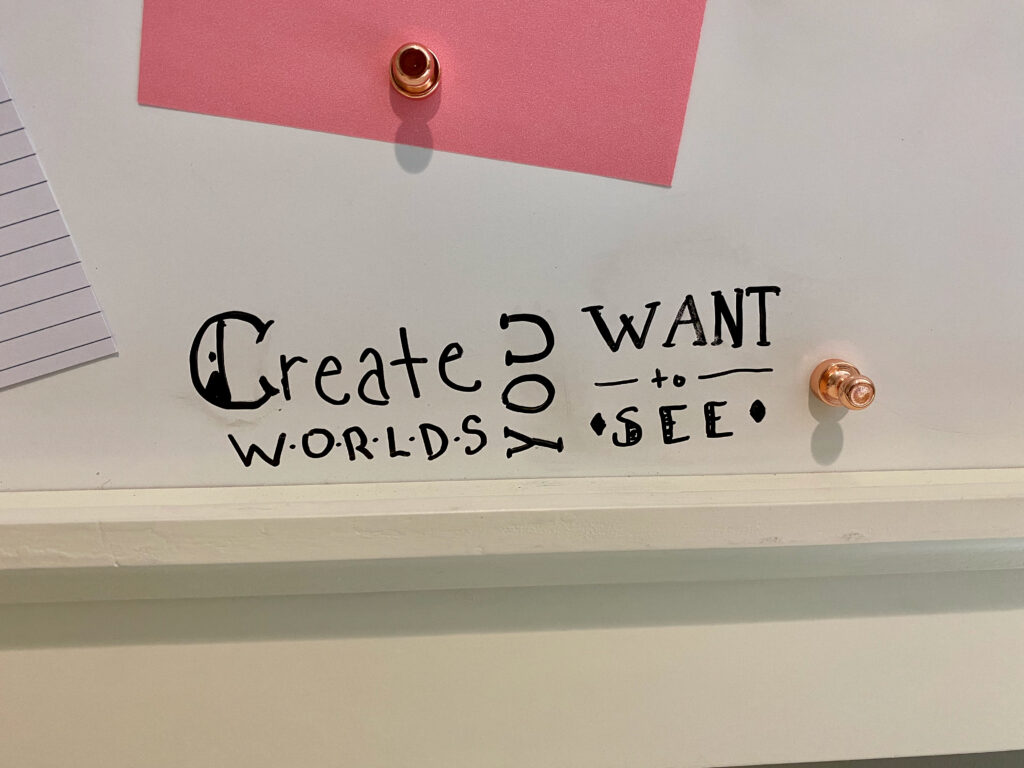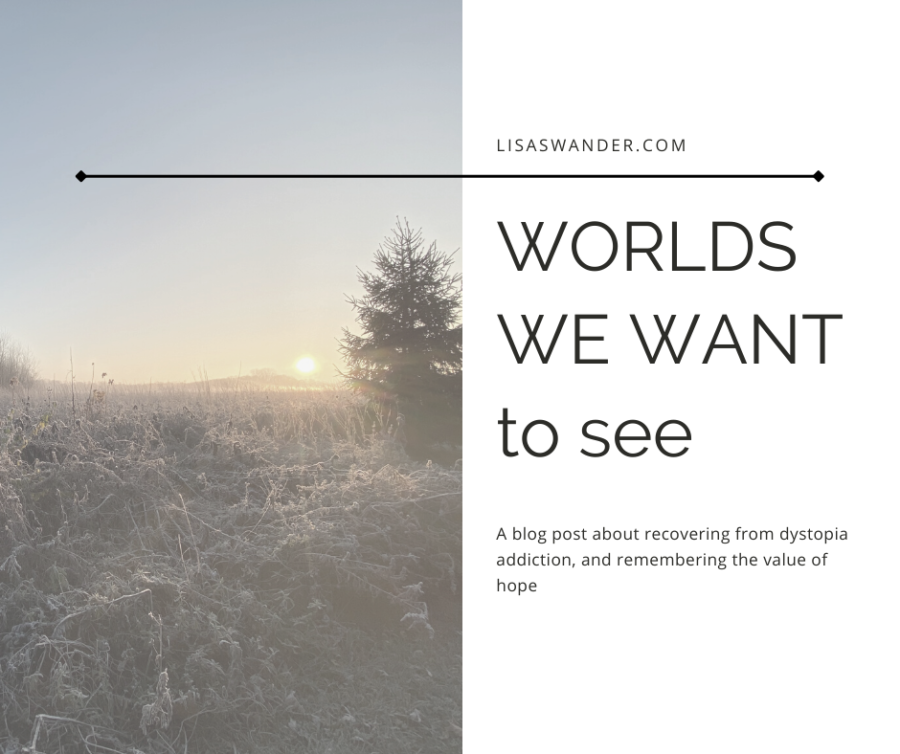A few weeks ago, I saw a call for submissions from an environmental magazine. The editors were looking for stories addressing the climate crisis, but not just any old romp through the failings of man and industry—they wanted stories in which the climate crisis was solved.
Everyone knows a hundred ways this goes south, they explained, and that makes people throw up their hands. To get people motivated to save the planet, we need more stories in which people save the planet.
Huh, I thought. Then I shrugged and walked to the kitchen for a cookie, waving at my collector’s editions of Jurassic Park and The Giver Quartet as I passed.
A few days later, I was feeling creatively parched and decided to get out a card deck of inspirational phrases. I shuffled and drew a pretty blue one that read, “Think beyond what you know. Create worlds you want to see.”
HUH, I thought.
One huh I can ignore, but two usually feels like I’m being elbowed in the spiritual ribcage. So I considered those two ideas, and tried to reconcile them with what sits on my bookshelf.
Historically, I read about worlds I don’t want to see.
Some of that is a byproduct of having taught middle school English for many years. Kids always need recommendations, and since my teaching career began in 2006 and The Hunger Games came out in 2008, I was immersed in the YA dystopia tsunami for the better part of a decade.
I didn’t mind, though, because the rest of that is just me. I bend toward a good apocalypse.
When I wasn’t reading for my classroom, I was watching large-scale disaster movies and thinking about ways we might all be vaporized before my next grading deadline. I’ve enthusiastically taught The Giver at every school that has employed me. When I had a little curricular clout, I opted to drag the accelerated class through Lord of the Flies because one fall of humanity per school year just wasn’t enough.
In any other year of my life, I think I might have rolled my eyes at that open call. As I always told my students in writing workshop, strife is more interesting than harmony. “If you don’t have a conflict, you don’t have a story,” I would say, slamming down seventh grade rough drafts and gesturing with a cigar. “So get back in there and add some more velociraptors.”
But this year it hits me a little differently.
Maybe it’s because, in 2020, I lived through an actual large-scale disaster and it sucked. Maybe it’s that my kids are getting older, and I’m not thrilled about handing them a generational mop and bucket and asking them to tidy up what’s left of the planet. Whatever the reason, I find that my appetite for exploring the shadows of the collective human psyche has waned.
I think I’m ready for some hope, please.
I’m not saying I need delusion. It’s important to know things are bad. But it’s also important to know they’re not hopeless.
Most dystopian novels—and movies—end with a little glimmer of hope, of course. Things will go to hell for three hundred pages and then someone will find out that the aliens are allergic to water or grenades or whatever in the last paragraph. Those stories have their merits, but for me, it’s no longer enough to know it will be okay for a ragtag band of shotgun-wielding survivalists.
I want to know it will be okay for all of us.
The logic of the environmental magazine is sound. When I hear about the climate crisis, my mind flips through a limitless rolodex of extinction scenarios. Yet I don’t have one, even one fictional conception of how we might get out of this mess. Ditto for political inaction, racism, patriarchy, and everything else that makes me white-knuckle the steering wheel during Morning Edition.
I’m not saying I need delusion. It’s important to know things are bad. But it’s also important to know they’re not hopeless.
When things seem hopeless—which can happen if you’re lurking around YA books with dark covers and shiny lettering—things also seem pointless. And when things seem pointless, people start drag racing and throwing empty Dasani bottles at bald eagles, because why wouldn’t they? What’s the point of taking care of a planet that’s doomed?
You wouldn’t do that if you had hope. Imagine if, when we read the news, we immediately thought of solutions. Imagine if visions of kind and empathetic societies sprang to mind as quickly as visions of national monuments crumbling into the ocean.
For me, that’s going to take some work.
I’ve been gleefully absorbing bleakness for years, and I don’t think a hopeful book or two is enough. The PH of my imagination is quite grim, and it will require substantial quantities of the good stuff to neutralize it.
But what of conflict, you say? Yes, yes, we need that, of course. Humans struggle, and a story doesn’t feel human without it. I’d just like us to take the guns and the usurping and the stadium death battles out of it.
I’m ready to read about more upstream conflicts, the kinds that, if we can give them due attention, keep the rocket launchers from getting pulled out in the first place—fear of rejection, fear of showing up. Internalized bias. Self-hatred. Self-betrayal. The inner conflicts the leaders of a hopeful, cooperative new world will have to reckon with in order to keep us from creating theme parks of reconstituted dinosaurs. Again.
After I’d considered all this, I wrote, in poorly rendered Pinterest lettering, “Create worlds you want to see,” on the dry erase board next to my desk.
I think the nudge for me was on both sides of my ribs—one for what I consume, and one for what I produce.
Stay tuned for some hope.




1 comment
Comments are closed.